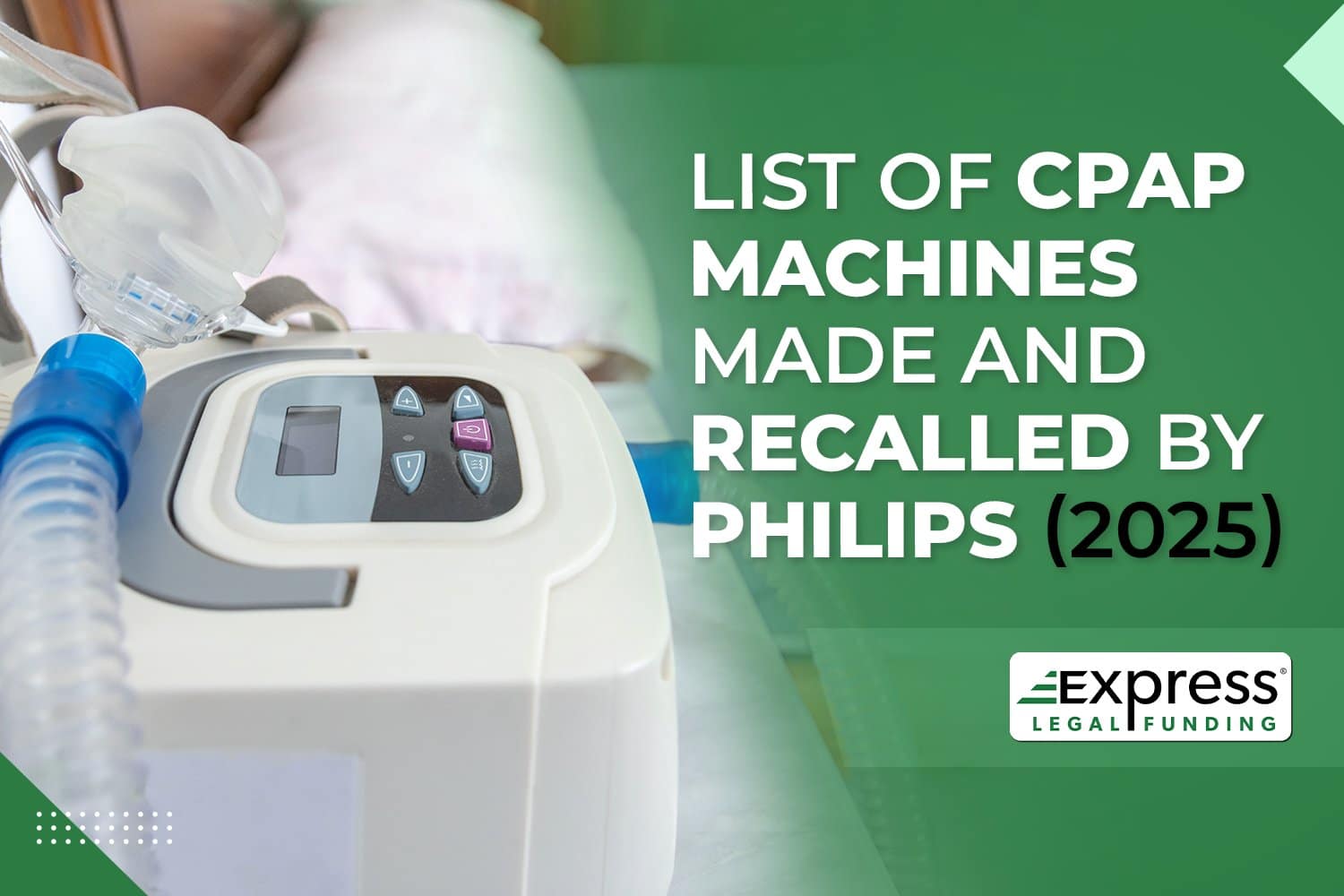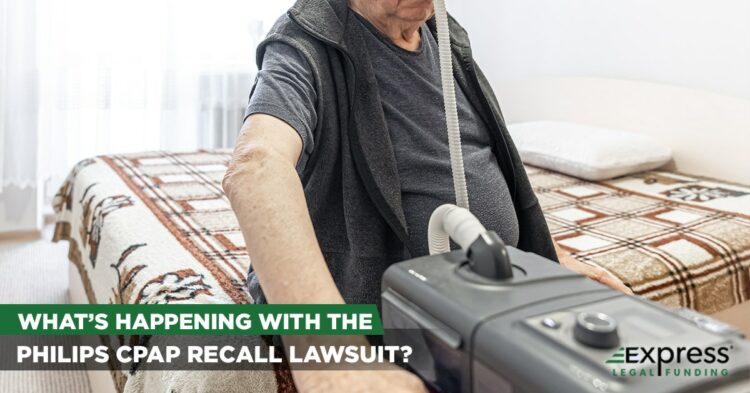
The Philips CPAP recall has led to widespread lawsuits as thousands of users claim they suffered serious health issues from defective sleep apnea machines. If you or a loved one used a recalled Philips CPAP, BiPAP, or ventilator device and later developed health complications, you may be entitled to compensation.
In this guide, we’ll break down everything you need to know about the Philips CPAP lawsuit, including the risks associated with these recalled machines, the latest legal updates, and what you can do if you believe you have a case.
Understanding your legal options is crucial, especially as settlements and claims continue to develop. Keep reading to learn how these lawsuits could impact you and what steps you should take next.
Latest Philips CPAP Lawsuit Settlement Update
Latest Update: Philips Respironics reached a tentative $1.1 billion settlement in late April 2024 to resolve U.S. lawsuits over its recalled CPAP, BiPAP, and ventilator devices. This deal allocates $1.075 billion for personal injury and wrongful death claims, with an additional $25 million earmarked for medical monitoring of affected users.
Philips also previously agreed to a separate $479 million class-action settlement (approved in September 2023) to reimburse consumers’ economic losses (e.g., costs of recalled machines). In total, these settlements aim to “put to bed” the vast majority of U.S. claims related to the 2021 Philips CPAP recall.
June 2025 Update:
As of June 2025, there are 829 Pending CPAP lawsuit claims against Philips.
What is Philips?
Koninklijke Philips N.V., colloquially known as Philips (not spelled Phillips), is a multinational technology conglomerate (multi-industry) primarily focusing on healthcare technology based in the Netherlands. The company was founded in 1891 by Gerard Philips and his father, Frederik.
Initially, the Philips company manufactured electro-technical products like carbon-filament lamps and lightbulbs. The company struggled and neared bankruptcy by 1895, but enjoyed a renaissance when Gerard’s younger brother, Anton, was hired.
Anton’s arrival heralded the company’s expansion into new technologies and industries that began Philips’ growth.
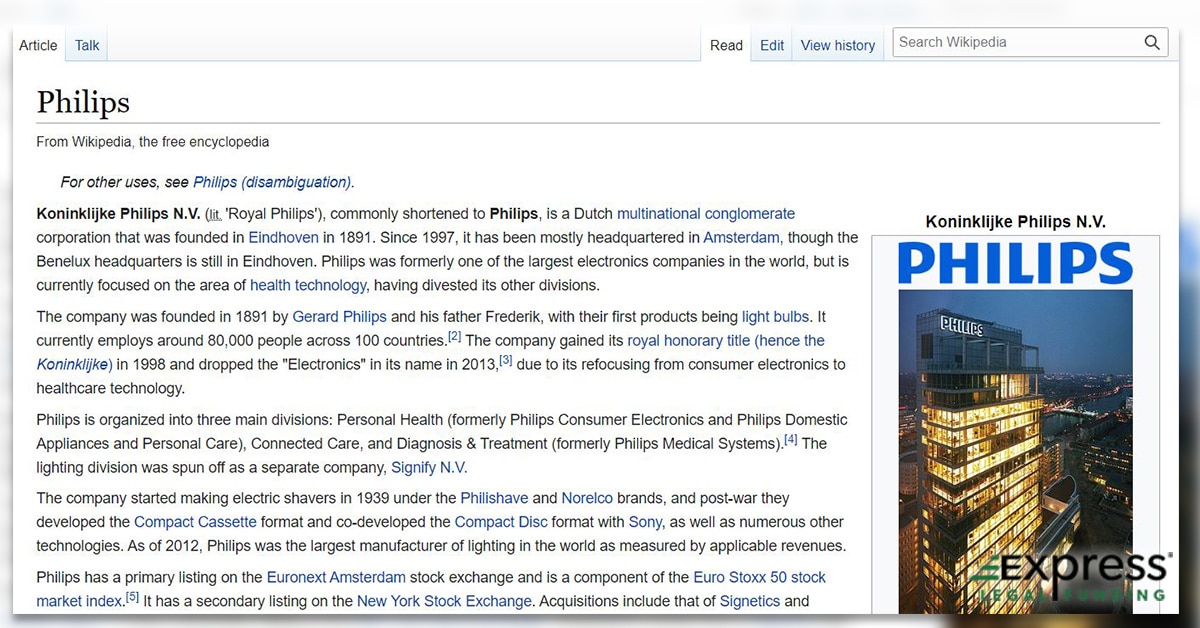
The company’s growth continued, producing vacuum tubes, radios, and engines by 1939. The company was forced to relocate its headquarters to the United States of America on May 9th, 1940, one day before the German invasion of the Netherlands during World War II. After the war ended, the company returned to the Netherlands and expanded into new personal and health technology forms.
As of 2020, the company has remained a primary manufacturer of several products commonly used by households. Among their medical device products is a series of bilevel positive airway pressure (BiPAP) and continuous positive airway pressure (CPAP) machines.
CPAP and BiPAP machines are designed to improve respiratory health while the user is asleep and act as breathing devices. These devices can go by many different names, including AVAPS, ASV, PAP, and APAP.
The Philips CPAP machines function the same way as those sleep apnea devices produced by other providers. But to start off, let’s define what a CPAP machine is for and how it works.
What is a CPAP Machine Used for?
A CPAP machine is a continuous positive airway pressure machine primarily used to treat moderate to severe cases of Obstructive sleep apnea (OSA), which is the most commonly diagnosed sleep disorder. The constant atmospheric pressure that the CPAP creates ensures the airway of the person wearing the ventilation device does not collapse or become blocked.
Doctors advise sleep apnea patients to use CPAP machines to maintain sufficient airflow and oxygen while sleeping. The constant force of the positive atmospheric pressure on the CPAP user’s airway(air blowing in from a face mask or nose mask) keeps the airway unobstructed for every inhale and exhale.
Studies show that CPAP machines are effective for treating Obstructive sleep apnea, which, if left untreated, can cause fatigue and potentially long-term cardiovascular issues.
In addition to treating sleep apnea, CPAP machines are used by doctors to treat the following:
- Upper airway resistance syndrome
- Respiratory distress symptoms in infants
Also, in recent history, at the height of the Covid-19 pandemic, on March 22, 2020, The United States Food and Drug Administration (FDA) released a statement suggesting to doctors that CPAP machines can be used when ventilators are unavailable for treating advanced cases.
There is no doubt that the function and purpose of the Philips CPAP machines work and have been helpful to many people, as sleep apnea machines have become critical to over 8 million Americans.
However, unfortunately, the success of Philips DreamLine CPAP machines has been marred by recent issues that have harmed its customers.
What Happened With Philips CPAP Machines?
Philips has encountered ongoing defects with its CPAP and BiPAP machines that required manufacturer safety recalls. On June 14, 2021, Philips issued a mass CPAP machine recall for a series of DreamStation Go CPAP machines, Dorma auto CPAP devices, BiPAP devices, and Mechanical Ventilator machines the company manufactures.
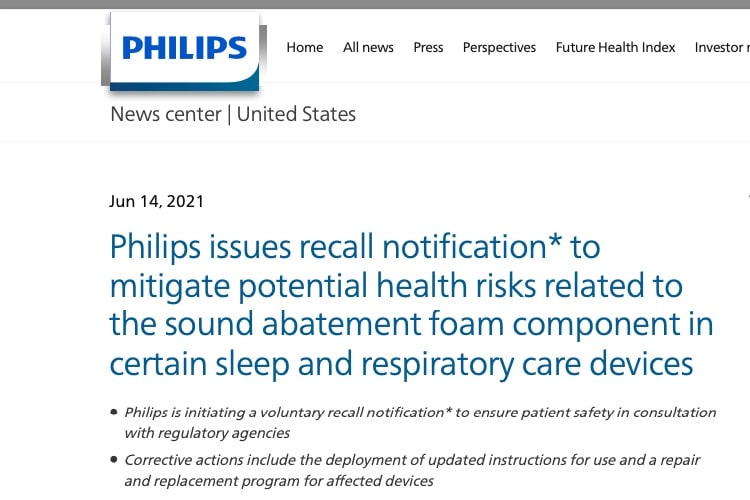
Philips issued the voluntary recall of almost all of its CPAP and BiPAP machines because of a discovered health risk from the Pe-pur foam, sound abatement foam, used in the recalled Philips medical devices.
This polyurethane foam is used in these machines to minimize their vibrations, which reduces the noise they make while in use. This is an important feature as CPAP machines can be noisy, making it difficult to rest undisturbed.
Unfortunately, as time went on, studies discovered that the Pe-pur foam used within the Philips CPAP machines was a significant issue that had jeopardized the health and respiratory care of its users.
Philips Pe-pur Foam Particles Can Cause Toxic Gas
The Pe-pur foam particles contain diethylene glycol, which can be dangerous when mishandled. Diethylene glycol can degrade and produce toxic gases that can get caught in the machines’ airways in the form of black particles, and the users inhale those gases.

The Pe-pur foam degradation can be caused by environmental factors such as heat or humidity, meaning the machines in those climates are more likely to have degraded soundproof foam.
Additionally, Philips devices over three years old are more likely to experience foam degradation due to wear and tear during daily use.
At this point, the biggest question you may have is why diethylene glycol toxins are dangerous and how they can harm you.
When inhaled, the gases produced by degraded Pe-Per foam can produce harmful respiratory side effects that impede your ability to breathe. In more severe circumstances, inhalation of these chemicals can cause lung cancer.
The sheer risk involved with inhaling diethylene glycol makes the presence of the chemical in Philips’ sleep apnea machines a concerning development.
Despite Philips claiming the emissions from their machines are not high enough to cause serious injury and health issues, people have fallen ill after using the recalled devices.
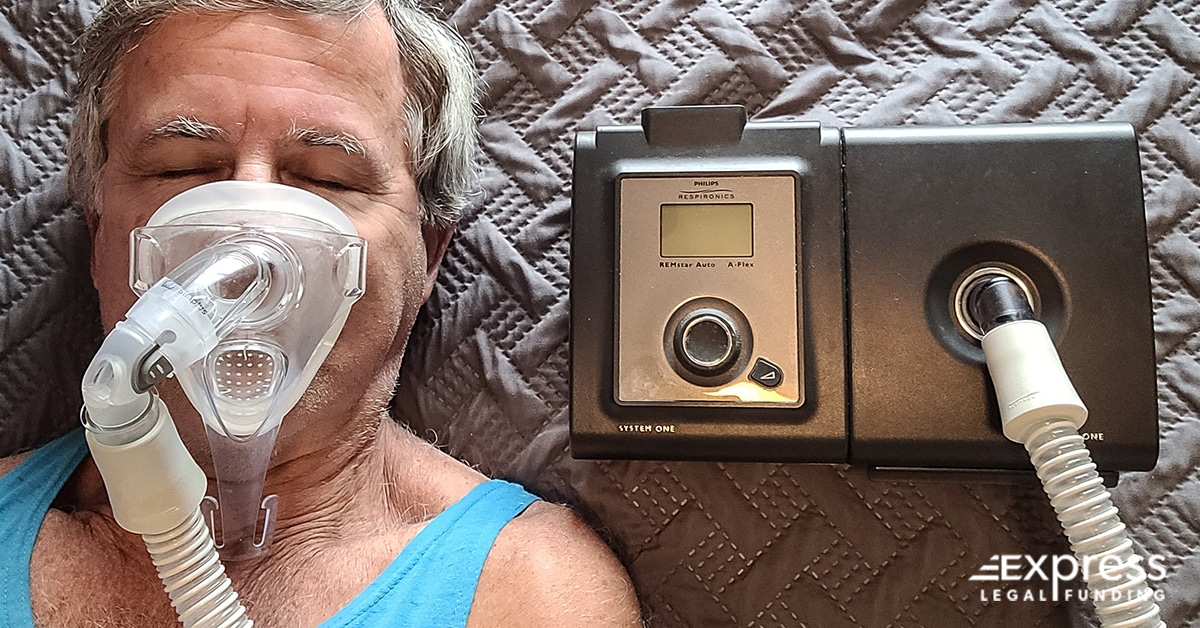
The most common potential health risks and carcinogenic effects of exposure to these toxins include the following:
Philips CPAP Lawsuit Symptoms and Side Effects
- Major respiratory problems:
- Permanent lung injuries
- Lung cancer
- Chest pressure
- Asthma (Can be a mild to serious condition)
- Minor respiratory issues:
- Inflammation of the airway.
- Chronic coughing.
- Irritated lungs.
- Cancer.
- Dizziness.
- Headache.
- Hypersensitivity.
- Damage to the liver, kidney, or other organs.
- Irritation of the eyes, skin, and respiratory tract.
- Sinus infection.
With this unfortunate development in Philips’ history, customers who used the sleep apnea machines are alleged to have been harmed and are dealing with the consequences of the dangerous and life-threatening chemicals within the soundproof foam.
Philips’ legal troubles began when the FDA (U.S. Food and Drug Administration) discovered that the polyester-based polyurethane foam used in the defective DreamLine CPAP devices failed a safety test for volatile organic compounds.
Since then, the situation has led several victims alleging harm from the Pe-pur foam to begin filing lawsuits against Philips. While it was not Philips’ intention to harm its consumers, the injured victims are suing Philips for being subject to the harmful substances within the CPAP machines used to treat their sleep apnea.
Is There a Class Action Lawsuit Against Philips CPAP Machines?
Keeping with an unfortunate trend in modern commerce of consumers suffering harm from defective devices and dangerous products, several users of Philips sleep apnea CPAP machines have begun filing lawsuits against the company for its negligence.
Several companies have experienced a similar situation with customers filing product liability or negligence claims. Philips is not unique in getting sued by claimants for alleged harm.
However, what makes this case different than many MDL lawsuits is that the lawsuit is not about medication with harmful side effects. Instead, the lawsuit against Philips concerns a medical device that is alleged to cause harm.
Philips CPAP Lawsuit Update 2025
Although the lawsuits filed against Philips are still in their infancy, the number of claimants suing Philips for alleged harm they suffered while using the sleep apnea machines is quickly growing.
SoClean Lawsuit Against Philips
The claims against Philips began appearing in 2021. One notable claim was filed by plaintiff SoClean on December 2, 2021, in Massachusetts.
The legal proceedings have been ongoing for over a year now, and while exact details are sparse, there is some general information to give us insight into the scope and direction of the case.

Update on the Philips CPAP MDL
As of June 2, 2025, the most recent update from the U.S. Judicial Panel on Multidistrict Litigation shows that there were 829 CPAP lawsuits currently pending against Philips in the Western District of Pennsylvania for its sleep apnea machines by the end of the class action MDL lawsuits.
There are also around 60,000 CPAP injury claims filed administratively with Philips using a toll system to avoid the statute of limitations running out for each case.
Last October, the courts consolidated 110 Philips CPAP sleep apnea machine claims into a single Federal court suit. With so many lawsuits already filed for the recalled Philips CPAP machines, it is very likely the company will face other multi-district litigation (MDL) down the road. The MDLs help speed up the filing process by making the required claim forms shorter and simpler to complete.
Although the number of claimants joining the MDL against Philips is steadily increasing, it will be some time before we can fully account for the total number of claims and plaintiffs involved.
As for the alleged claims made against Philips for its DreamLine breathing machines, most plaintiffs are alleging the following in their filed lawsuits:
Lawsuits Against Philips CPAP Machines
- Negligence
- Design Defect
- Negligent Design
- Negligent Failure to Warn
All of these claims against Philips for the alleged harm caused to claimants by the soundproof foam are serious and could compel a jury to award the plaintiffs significant sums of money.
The more Philips CPAP law firms can prove Philips knew about the danger of the Pe-pur foam but failed to warn the public, the more likely the bellwether plaintiff will be awarded large sums.
That’s easier said than done, as the defense lawyers representing Philips will do everything they can to stop the case from proceeding and convince the judge it is without merit. That is what defense law firms hired to represent manufacturers in class action lawsuits and mass tort cases are supposed to do.
Like a personal injury case, where a plaintiff sues a defendant for financial compensation for an alleged negligent tort, so is the case for the claimants suing Philips CPAP machine product liability lawsuits. That begs the question of what the estimated settlement will be for victims of the Philips CPAP situation.
In personal injury claims where the injured party was harmed due to the other’s negligence, settlements are the most common form of compensation.
The settlement is designed to provide financial compensation for the cost of the injuries and damages inflicted upon the victim. So is the case for the claimants in the Philips CPAP machine lawsuit. They are suing Philips, the defendant, for money.
How Much is the Philips CPAP Lawsuit Worth?
For the lawsuit against Philips, the potential settlement amount concerns the toxic chemicals their customers inhaled via the CPAP machines Philips produced. So the expected settlement amount payouts for the Philips CPAP MDL lawsuit will be limited by the case’s criteria and each plaintiff’s situation of how they claim to be harmed.
Projected Individual Payouts from the Philips CPAP Lawsuit Settlement
Individual payout amounts will vary widely based on each case’s circumstances. If one simply divides the $1.075 billion fund by an estimated 60,000 claimants, the average comes out to around $18,000 per claim. In practice, however, payouts won’t be equal.
A point system is being used to allocate compensation so that some plaintiffs receive far above the average, while others (with weaker claims) may receive little or nothing.
Lawyers expect that the most severe injuries (for example, cancer cases) could get six-figure payouts on the order of $100,000 to $500,000 each.
By contrast, claimants with less serious harm or uncertain proof might recover only five-figure or even minimal amounts.
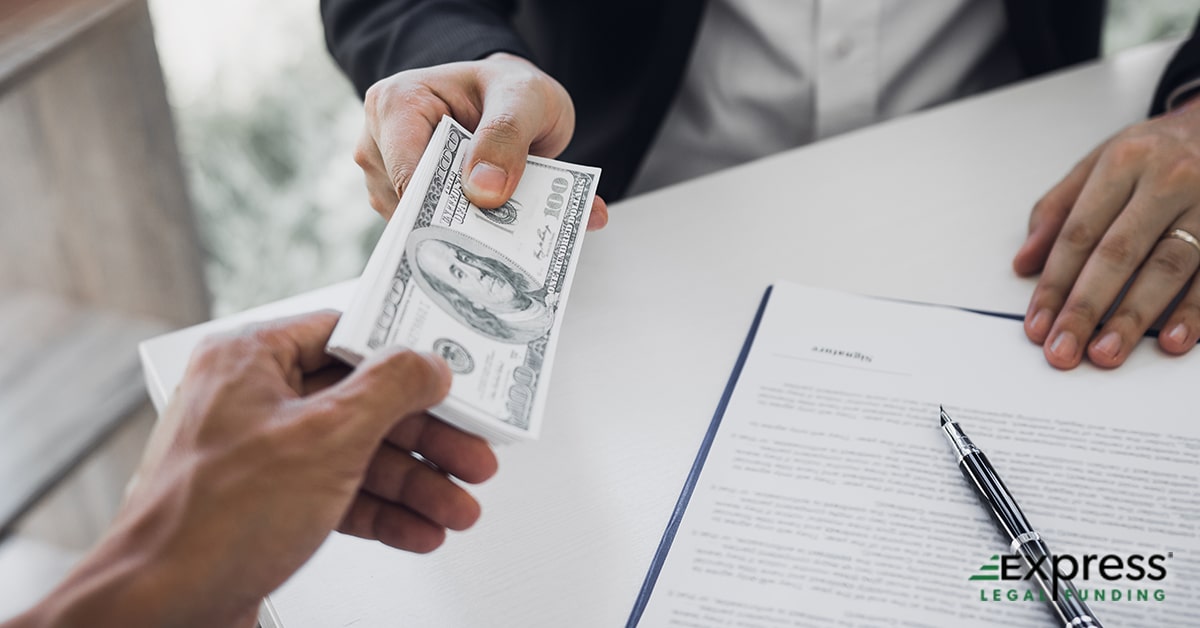
Some factors that will directly affect each plaintiff’s settlement amount are based on their unique circumstances around using the Philips CPAP or BiPAP device. Those factors may include the following:
What Can Affect Your Philips CPAP Lawsuit Payout Amount?
- The amount of time a claimant used a Philips Dreamliner CPAP machine. The more years of use, the greater the settlement amount.
- The particular negative side effects and adverse health issues the claimants suffered after using the Philips CPAP device. Plaintiffs who claim to have gotten cancer from the gases produced by diethylene glycol in the sound abatement foam will receive more than those who are suing Philips, alleging the DreamLine machines caused Asthma or coughing.
These amounts are significant, but they are also not concrete, as the case could still go in another direction that could increase or decrease the settlement totals. At this point in the case, we can’t make a definitive estimate on the Philips CPAP recall lawsuit settlements that will be paid out, as the bellwether trial awards will be the best indicator for that.
The good news is that the chance of there not being settlement payouts for the plaintiffs suing Philips for the recalled CPAP machines is much lower than with most mass tort and class action lawsuits. This is because Philips has already acknowledged many allegations against them about the danger of the sound abatement foam.
So, it is now the job of the attorneys handling the cases to prove the highest level of Philips’ alleged negligence they can in the CPAP incident and continue to process the claims through the legal system.
Court Precedents From Similar Cases Can Help Estimate Settlement Amounts
When it comes to the American justice system, there is a concept of court precedent. Lawyers use court precedent when suing on behalf of the plaintiff and representing a defendant.
It’s a critical concept that allows lawyers to point to details of prior lawsuits in hopes of showing the judge they are arguing in front of now (or can if they file a lawsuit) that a previous court sided with a similar argument they are making. By doing so, the lawyers, in theory, should get the same court verdict for the current claim they are arguing for or against.
Of course, it is never a straight path to a class action lawsuit victory, especially for the plaintiff. When lawyers reference previous case trial awards or settlements to estimate a potential MDL settlement, they use prior settlements from similar lawsuits as court precedent.
That is how they feel confident that the numbers are sufficient for considering the case’s prospects for financial compensation via bellwether trials and settlements.
Example Case of Court Precedent to Estimate Settlement for the Philips CPAP Recall Case:
The Allergen breast implant lawsuits can act as court precedents as they are an example of a medical device that worked but is alleged to have caused harm by having cancer-causing side effects. This led many women who were diagnosed with cancer after having breast implant surgery to sue Allergan in a class action lawsuit.
In the end, juries found that Allergen Inc., the company that made the breast implants, failed to warn consumers about the risk of the increased implants causing cancer. So with the breast implant lawsuits still being active, women and their families are receiving settlements anywhere from over $100,000.00 USD to even above $1,000,000.00 USD.
Successful claims like this are what lawyers might cite as case precedent while working toward the first bellwether trials.
The remaining question is who qualifies to participate and file a claim in the CPAP recall lawsuit against Philips.
How do I Qualify to Join the Philips CPAP Class Action Lawsuit?
The Philips CPAP recall class action lawsuit requires specific criteria for a plaintiff to qualify to file a claim. That is because Philips, the defendant, has rights regardless of any harm they are alleged to have caused.
In large lawsuits, these criteria help prevent false allegations from factoring into the final settlement consideration and simplify the MDL claim process.
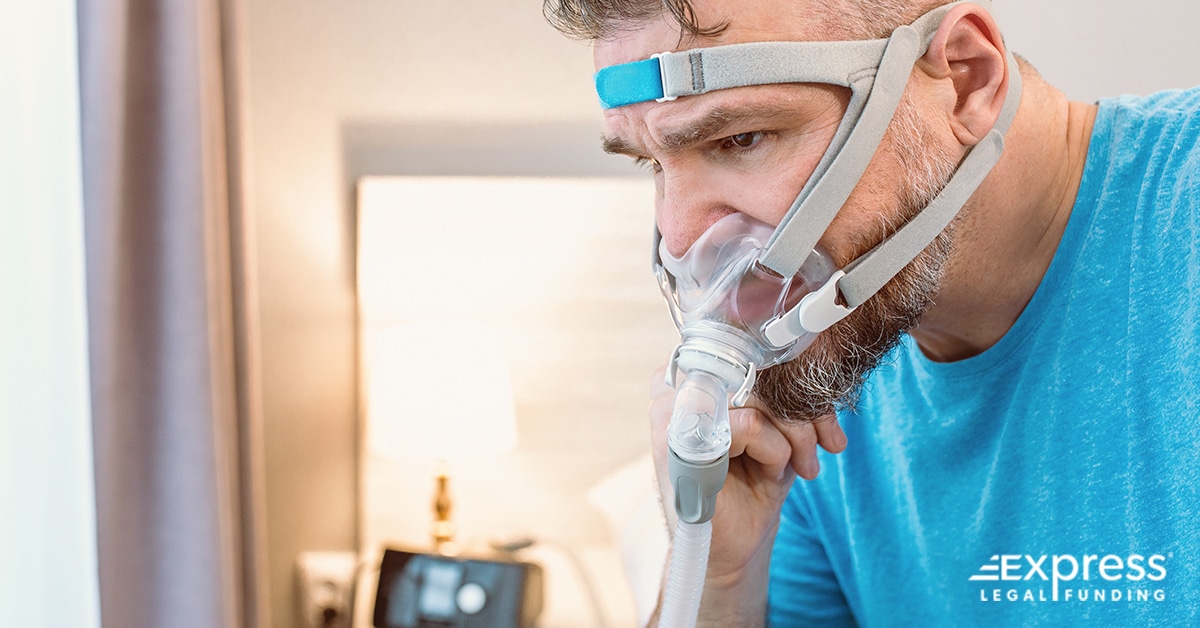
To qualify for participation in the Philips CPAP recall lawsuit, a plaintiff must meet the following criteria:
- The plaintiff must be under 80 years old and have used one of the recalled Philips sleep apnea devices or ventilator products.
- The plaintiff must have experienced the harmful effects of the recalled products.
- If the plaintiff does not meet the above criteria, they must have lost a loved one due to the criteria.
Philips Has Recalled CPAP and BiPAP Machines:
Continuous Ventilator, Non-life Supporting
- DreamStation ASV
- DreamStation ST, AVAPS
- SystemOne ASV4
- C-Series ASV
- C-Series S/T and AVAPS
- OmniLab Advanced+
- A-Series BiPAP A40
- A-Series BiPAP A30
Continuous Ventilator
- Trilogy 100
- Trilogy 200
- Garbin Plus, Aeris, LifeVent
Noncontinuous Ventilator
- SystemOne (Q-Series)
- DreamStation
- DreamStation Go
- Dorma 400
- Dorma 500
- REMstar SE Auto
Anyone who meets these criteria is technically eligible to participate in and file a lawsuit against Philips. For a personal legal consultation, you should seek legal advice from an attorney involved in the Philips CPAP class action lawsuit to determine your eligibility.
They will be able to answer questions about your specific circumstances and how your eligibility might be affected depending on how long you used one of the Philips breathing machines and what side effects you experienced.
That said, contacting a law firm and having a free case evaluation is ultimately your decision and should not be altered by this article.
If you are eligible for participation in the Philips lawsuit, you should take the next step by speaking to a Philips CPAP lawyer and providing the required information. By doing so, you can ensure that you will remain within the bounds of the statute of limitations (SOL).
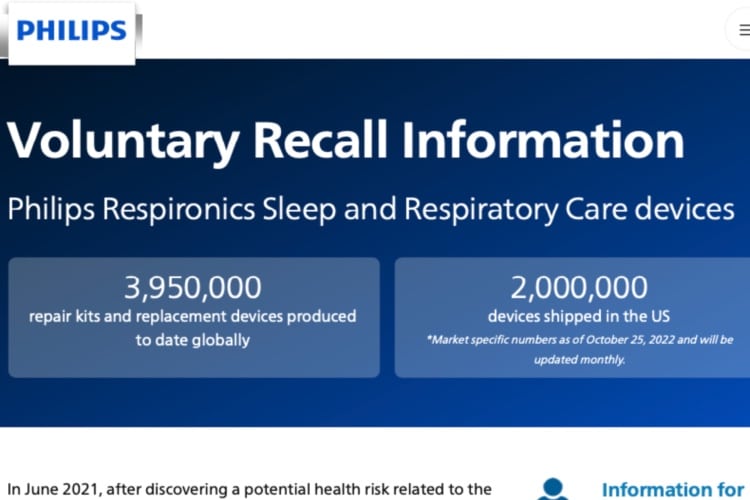
The more relevant medical records and documents you can provide, the easier you make it for the law firm to add you to the Philips class action lawsuit and maximize your settlement.
Closing Statements on the Philips Recall CPAP Machine Lawsuit
Philips’ legal troubles follow a trend of alleged negligence against some of today’s top conglomerates and companies.
While the situation with Philips’ CPAP devices involves serious allegations, the company has already conceded to some crucial facts, as the production of the Philips Respironics CPAP machines with a different sound abatement foam was first indicated in March 2020.
This is a start that should not be overlooked compared to many companies in mass torts that make mistakes and continue to deny them.
When that happens, it only makes the accompanying lawsuits a more demanding legal battle.
Fortunately, our legal system allows civil claims for alleged negligent tort caused by companies, large and small, to compensate the victims and act as a deterrent to keep these companies accountable and less inclined to engage in further misconduct.
It’s fair to say Philips did not begin the plans for their CPAPs and ventilator devices, knowing the alleged harm would befall its consumers. However, there is always somewhere in between as we dive into further details and other areas of the law.
Like, when did Philips first find out about its CPAP machine sound abatement foam causing toxic gas, and why did it take so long for the company to warn the public?
These are questions lawyers are asking on behalf of the Philips CPAP recall victims. CPAP law firms are attempting to hold Philips responsible and recover the plaintiffs’ losses. Unfortunately, that legal process will likely take a few years to develop.
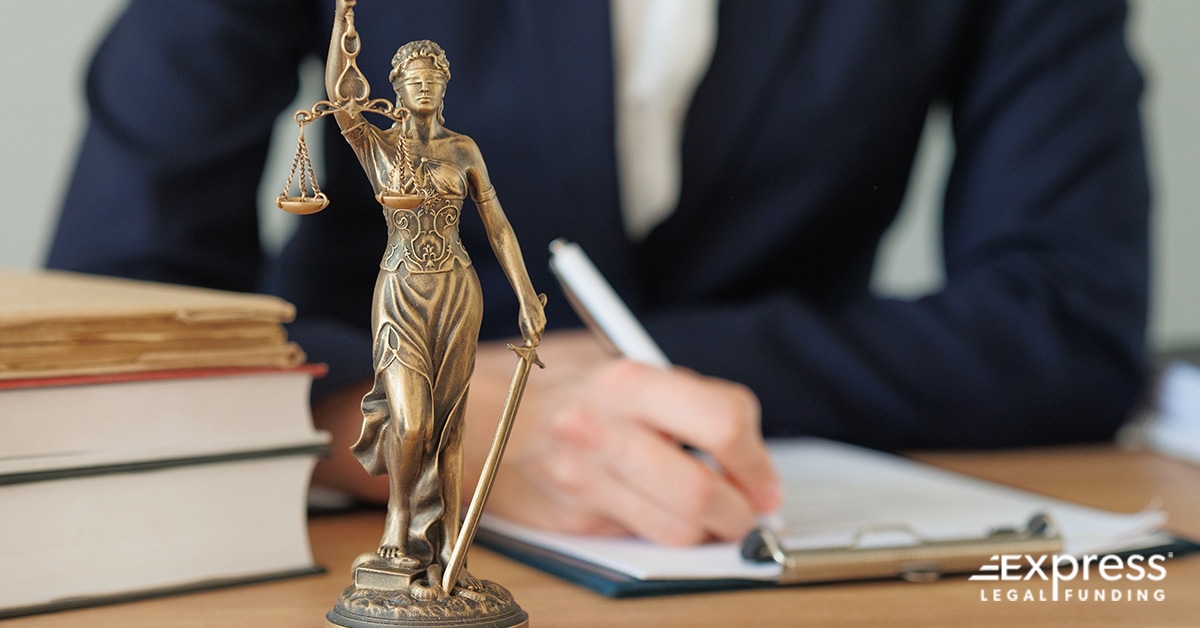
Class action and MDL lawsuits take notoriously long times. The case against Philips is no exception.
If anything, the lengthy waiting time will be made worse by the Philips CPAP recall plaintiffs having to live with the health issues they claim to have suffered from the use of the recalled sleep apnea machines. The cost of living is expensive enough, but the high cost of medical bills and supplies compounds that heavy burden.
Fortunately, we at Express Legal Funding understand that financial reality, which is why we provide pre-settlement funding to plaintiffs in civil lawsuits. The money can be offered to injured and damaged victims actively pursuing a case as a non-recourse cash advance. That means it is risk-free funding and is not a loan.
As a legal funding company, we purchase a piece of and place a lien on the potential settlement or trial award money, and not on the client. Not like a company would do if it were giving a borrower a loan. That difference allows for the main benefit of lawsuit funding to work risk-free.
It can be a great financial option for those who need money now, can’t access funds from elsewhere, and can’t afford to put their bills on hold to wait for their case to be settled or won.
(It is important to note that the money we can provide to injured workers in Missouri is a loan and, therefore, not risk-free. Pre-settlement loans in states like Missouri are loans and must, technically by law, be repaid. Express Legal Funding-Missouri, LLC is licensed to give these loans in MO.
We hope you found this a helpful and easy-to-read resource to learn about the Philips CPAP recall lawsuit. If you found this article interesting, we encourage you to browse some of our reader favorites and most-read articles published on the Express Legal Funding blog.
If you have questions about whether your Philips CPAP recall claim can qualify for our pre-settlement funding service, you can contact us to learn more and apply with our risk-free consultation anytime.

